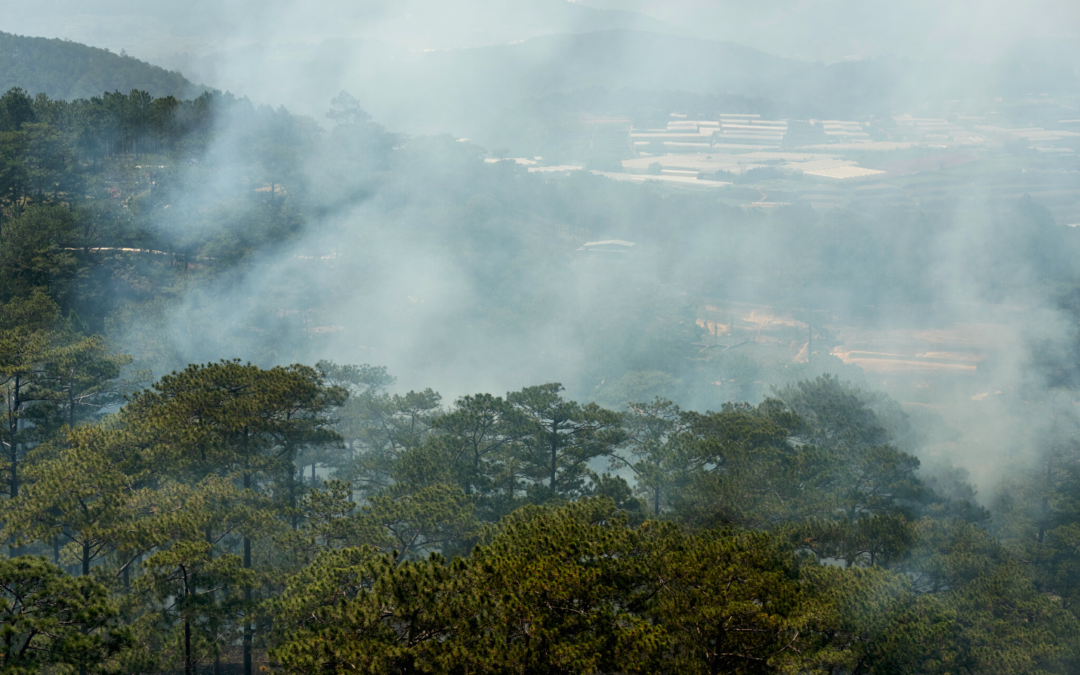As wildfire smoke makes its way across Canada and some parts of the United States, it’s important to be alert about its health risks. Breathing in clean air allows healthy living conditions for our heart and respiratory health to thrive. When air quality drops, taking the necessary steps to protect your health can reduce your chances of getting ill.
Wildfire smoke contains harmful pollutants such as fine particle matter, carbon monoxide, nitrogen dioxide, volatile organic compounds (VOCs), and other toxic chemicals. The fine particles pose the most risk because it gets stuck in the lungs and bloodstream. “Breathing in these pollutants can irritate the respiratory system, worsen existing conditions like asthma or chronic obstructive pulmonary disease (COPD), and even cause short-term and long-term health problems,” adds Dr. Ingemaud Gerber, our INLIV Medical Director.
While wildfire smoke is hazardous for everyone, some people are at a higher risk of experiencing health problems than others. These include infants and children, seniors, pregnant women, people with existing health conditions like cancer, heart and lung disease, and those who work or play sports outdoors.
Symptoms of Wildfire Smoke Exposure:
As reported by the Government of Canada, when you’re exposed to wildfire smoke, it can lead to reactions like headaches, a mild cough, phlegm buildup, sore and watery eyes, and nose, throat & sinus irritation.
More serious symptoms can include dizziness, chest pains, shortness of breath, and other discomforts.
Staying Healthy and Protected:
Canada uses the AQHI (Air Quality Health Index) to know when air pollution becomes a health risk. The scale ranges from level 1 to 10+, with levels 7 to 10+ representing high health risks. If your community’s air quality index reaches high-risk levels, protect yourself and your family immediately.
Dr. Gerber’s recommendations for protecting yourself and minimizing health risks:
1. Keep indoor air clean: It’s essential to ensure the air in your home is clean; stay indoors with the windows and doors closed, and turn on your air purifiers or filtration systems, if available. If you use an air conditioner, set the humidity levels between 30-50%. Additionally, you can install a carbon monoxide alarm in your home.
2. Refrain from smoking: Smokers have a high risk of getting lung infections during this time; try to avoid smoking to reduce health risks.
3. Consult your doctor: If you have pre-existing health conditions such as cancer, diabetes, and lung and heart conditions, consult your doctor for personalized advice on avoiding health risks.
4. Get supplies: To prepare your household, get an adequate supply of necessary medications, food, and water. If you must spend time outdoors, consider wearing a well-fitted respiratory mask like an N95 mask.
5. Take care of your well-being: During heavy smoke days, drinking lots of water and keeping your body cool is crucial. You should also limit exercise and other physical activities that make you sweat or cause heavy breathing; this may affect your mental health, so be aware of feeling anxious or depressed. If you think your mental health is declining, contact a psychologist for more support.
If you or your family member are experiencing severe symptoms due to smoke exposure or inhalation and need emergency care, call 911.
To learn more about INLIV, reach out to one of our health advisors, email us at getINtouch@inliv.com, or give us a call at 403-538-8881


